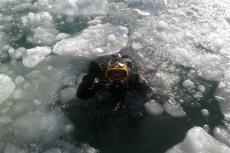For the Love of Our Families
Balancing the joys of diving with the duty of safety.
As we were finalising this issue, we received the tragic news of Jared Hires’ passing in Plura Cave in Norway—a location we coincidentally feature in this edition. At just 33, the Dive Rite CEO leaves behind his wife, his young son and daughter, his mother and his father, the dive industry stalwart Lamar Hires, whom we have also profiled in our magazine. The Hires family is one I hold in high regard, and this news has left me deeply saddened.
According to experts in diving accident analysis, this tragic accident was likely caused by a medical event and the predisposition of the diver—not equipment failure.
Throughout my career in dive magazine publishing, I have generally refrained from dwelling on the mishaps or fatalities within diving, other than to acknowledge the loss of notable individuals under tragic circumstances.
Drawing a parallel with motoring, driving can also be perilous. However, whilst fatalities can occur in traffic, most of us manage our daily commutes, enjoy leisurely drives and weekend excursions to the forest, or holiday road trips with family and friends, in relative safety. If I were to edit a motoring magazine, the emphasis would be on car reviews, mechanical insights, motorsports, and the joys of vehicular travel, not delving into accidents, yet still maintaining a firm focus on safe driving practices.
In this edition, we feature my interview with RAID’s CEO, Paul Toomer. Over the years, I have been privileged to have extensive discussions with him. A recurring theme in these discussions was the profound responsibility we have as divers to return to our families unharmed. This imperative guides every aspect of my dive preparation and risk assessment. At the risk of sounding like a broken record, it is a duty of care we owe to our loved ones to exercise prudence, make sound choices, and be willing to withdraw when the situation is amiss.
It is neither fair nor responsible to leave our families in a state of worry, or worse, grappling with the aftermath of an injury or the profound grief of loss. Stepping back when conditions are doubtful, choosing an alternative approach, or abstaining altogether, ensures that we can enjoy future dives. Prioritising safety today affords us the promise of tomorrow’s underwater adventures.
Safety goes beyond the robotic adherence to strict rules and meticulous protocols; it also involves a deep dive into one’s psyche, an exploration into one’s mental landscape, highlighting our innate vulnerability to errors. This journey into understanding human behaviour is as intriguing as it is vital, and it is interesting.
Many have been entertained by the artistry of magicians on stage, and some of us have perhaps suffered the cunning misdirection of pickpockets. Both skilfully exploit our cognitive blind spots. These blind spots may also be a risk factor when diving.
As regular viewers of the popular documentary series Air Crash Investigation (Mayday) will have learnt, it is the unnoticed slip, the human oversight, that often precedes mishaps, leading to significant incidents even among very experienced flight crews.
Susceptibility to error is an inherent human trait; we can all be tricked, deceived, distracted, or make mistakes. No one is immune.
However, by recognising and understanding the root causes of mishaps, we can design and implement safety measures to mitigate risk.





























